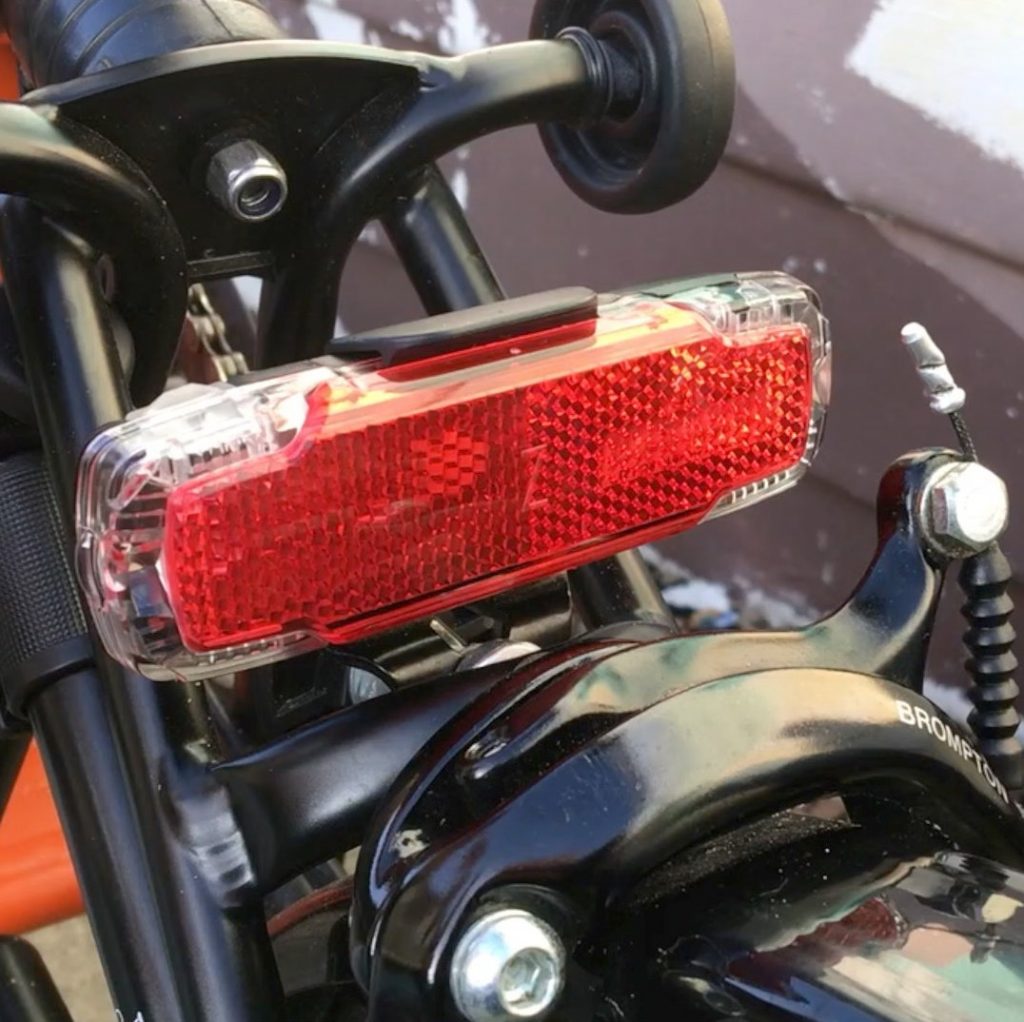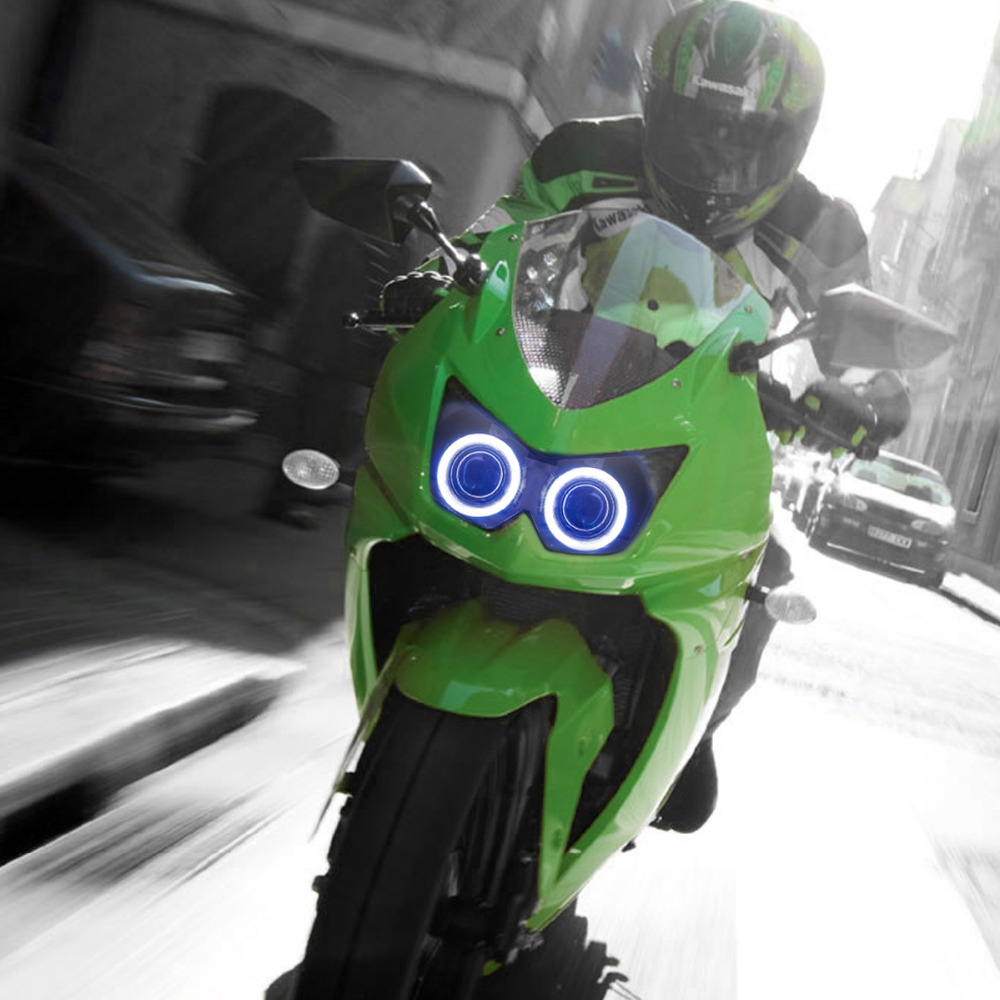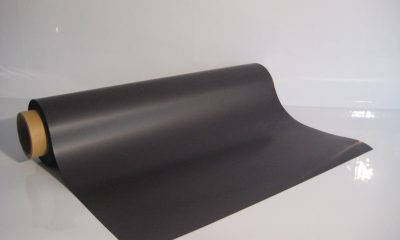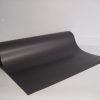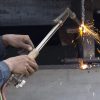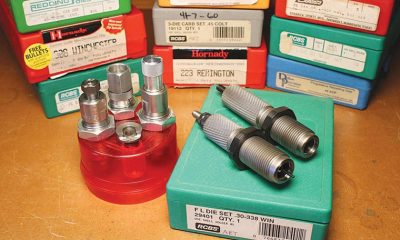Tech & Gadgets
A Guide to the Different Types of Motorbike Lights and Their Benefits
No matter what type of bike you ride, there’ll come a time when your lights won’t be performing as expected. This can be for a range of different reasons, from dim lights, blown bulbs, or headlights that aren’t aligned as they should be. Needless to say, lights and safety go hand in hand. How they perform can be the difference between having a clear view of the road ahead, and being able to detect other vehicles, pedestrians, or road obstacles in time to react accordingly, or getting caught out in the dark and involved in an accident.
Fortunately, lighting tech has come a long way, and riders can upgrade their motorbike lights to be able to see and be seen at any time, and in any type of weather. This is not only restricted to new bikes but also older classics running on outdated electrics. The goal is for heightened visibility, better brightness levels, and consistent lighting in varying conditions, as well as having lights that will last. Riders also have the choice of different designs, meaning there’s a level of customisation to get the look you want.
Types of Motorcycle Lights
Motorbikes are fitted with several types of lights – headlights, brake and taillights, and front and rear indicators. These are mandatory on any bike that you want to ride on the street. Additional lights include daytime running lights (DRLs), as well as marker, position, spot, and fog lights. Accent lighting is also used to highlight specific parts of the bike.
Headlights
Headlights are of two basic types – reflector and projector lights. Reflector headlights can be found on older bikes and consist of a tungsten filament bulb encased in a steel bowl. Light is reflected forward with the careful placement of reflecting mirrors. Early versions were sealed, meaning they needed complete replacement when the bulb died. Reflector lights are some of the cheaper motorcycle lighting varieties, simple to make, and assume an old-school look.
Projector lights started appearing in the 1990s and now are a staple on all new bikes. They’re similar in design to reflector lights but ditch the reflective mirrors for a front magnifying lens, in addition to a cut-off shield to brighten and project the light forward. Compared to reflector lights they’re either fitted with a Xenon HID filament or LEDs which makes them much brighter, more consistent (no dark spots), and easier on oncoming traffic. A variant of projector lights is multi-directional lights fitted exclusively with LEDs. These emit light from the entire bulb or LED globe, so additionally enhance peripheral visibility.
The halogen bulbs in your bike’s headlights can be replaced with LEDs or LED and HID conversion kits. All you need is some basic motorcycle tools and LEDs or Xenon bulbs that are compatible with the socket. Bikes run either single filament H1 bulbs, dual filament H4 bulbs, or single H7 bulbs. Going for LEDs means brighter and more powerful light, lower power use, less hassle or worry about blown bulbs (these things last), and lights that aren’t affected by heat or vibrations. In a word, they’re better in every way.
Tail and Brake Lights
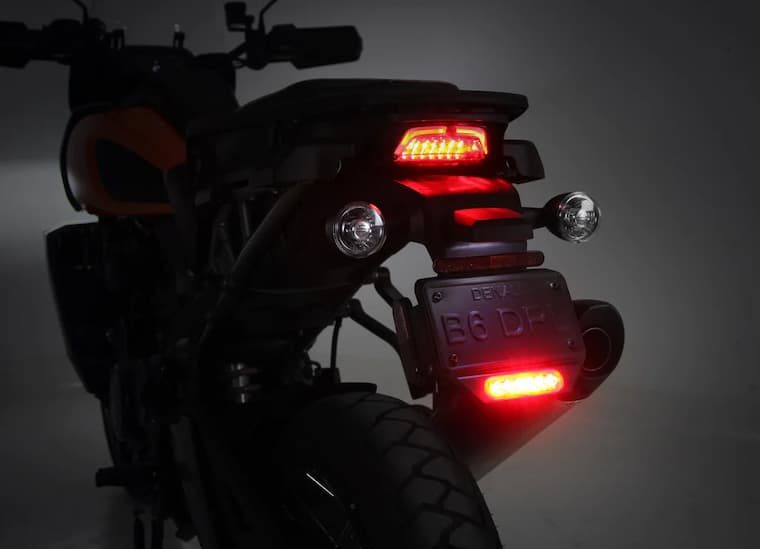
Being visible to traffic behind you is delegated to the tail lights. These are often found in the same unit housing the brake light but shine in a brighter shade of red. This is to inform other drivers and riders that you are riding, slowing down, or coming to a complete stop. Tail lights turn on together with the headlights, while brake lights shine only when applying the brakes. As with headlights, older bulbs can be replaced with LEDs if you’re after lights with a bit more sparkle.
Indicators
These inform others that you are about to merge, overtake, or turn. Anyone not happy with the style, quality, or performance of stock indicators can choose from dozens of different designs, sizes and shapes. Indicators can also be mounted on different positions on the bike, with the front pair riding on handlebars, forks, or fairings, and rear indicators either part of the tail and brake light assembly or standalone variants mounted to rear fenders, seats or pannier bags depending on the type of bike. Here too, riders can change out halogen bulbs for better-performing and brighter LEDs.
Additional Lights
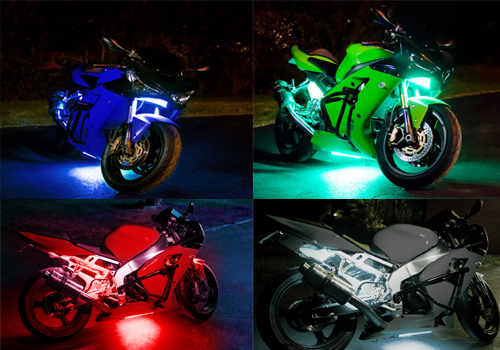
The three types mentioned above are required by law. Riders can also add daytime running lights, again in various dimensions and styles, often fitted as standard with flashing LEDs. These motorbike lights considerably reduce the risk of not being spotted during daylight rides. Marker lights also help with safety, as they inform other traffic participants of the size and width of the bike. Position lamps are only required by bikes not fitted with a standard headlamp, such as dirt bikes. Fog and spotlights serve their purpose well during rain, fog, and inclement weather, being attached both front and rear. Whereas ornamental accent lights and light strips are there to add a bit more presence. The majority are fitted with LEDs as a low-power option putting less strain on the bike’s electrical system.
What to Consider
When shopping for headlights, you can choose between different sizes, ranging from 4 to over 7 inches. Pay attention to the materials used in the housing and lens covers as these need to be impact and water-resistant. Look for IP ratings to ensure that what you’re getting will last. Also, have in mind bulb and LED compatibility when upgrading as not all LEDs will fit or work with the standard socket types. Lastly, to get lights working as they should look for included or wiring sold separately. For an easier fit, these should be with simple plug-and-play connectors and housed in sealed insulation.
Writing for the blog since 2012, Chris simply loves the idea of providing people with useful info on business, technology, vehicles, industry, sports and travel – all subjects of his interest. Even though he sounds like quite the butch, he’d watch a chick flick occasionally if it makes the wife happy, and he’s a fan of skincare routines though you’d never have him admit that unless you compliment his impeccable skin complexion.

